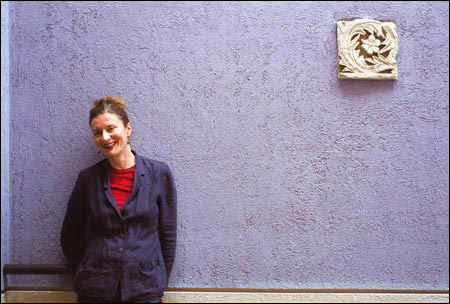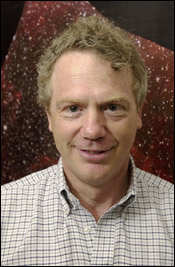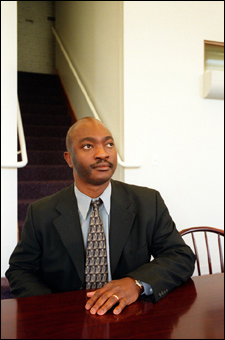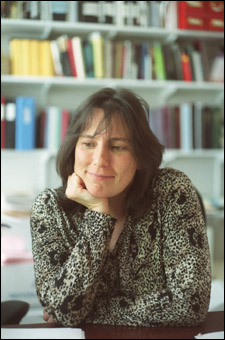Four named Harvard College Professors
Teachers, advisers, mentors honored with award


In recognition of their dedication to teaching, advising, and mentoring undergraduate students, four distinguished members of the Faculty of Arts and Sciences have been named Harvard College Professors.
The prestigious five-year endowed chairs have been awarded to Emmanuel Akyeampong, professor of history, and of African and African American studies; Anne Harrington, professor of the history of science; Robert Kirshner, Clowes Professor of Science, and master of Quincy House; and Ewa Lajer-Burcharth, professor of the history of art and architecture.
“Each of these distinguished professors plays a multifaceted role in the lives of their students. They are not only teachers and scholars of the first order, but also mentors and role models,” said William C. Kirby, dean of the Faculty of Arts and Sciences, and Edith and Benjamin Geisinger Professor of History. “At a time when we are rededicating the faculty to undergraduate education, it is particularly fitting that we celebrate their dedication to our students. They are richly deserving of this honor.”


Harvard College Professorships, made possible by an endowment gift from John and Frances Loeb, recognize dedication to undergraduate teaching across the board – in the Core and general education, teaching within one or more concentrations, and advising and mentoring individual students – as well as outstanding contributions to graduate education and research. Recipients receive additional support for their research and scholarly activities.
Akyeampong, who came to Harvard in 1993, has written numerous publications focused on cultural, political, and social life in his native Ghana. Two of the most notable examples are a book focused on the eco-social history of the Anlo of Southeastern Ghana, and another on the social history of alcohol in Ghana. And, he has taught courses on alcohol in sub-Saharan Africa, gender in African history, and the slave trade between Africa and the United States, among many others. He earned his Ph.D. in African history from the University of Virginia in 1993, M.A. in European history from Wake Forest in 1989, and B.A. from the University of Ghana in 1984.
Of the Harvard College Professorship, Akyeampong said, “To be recognized as a Harvard College Professor for distinguished contributions to undergraduate and graduate teaching and mentoring is something I could never have imagined. I have a passion for teaching, and student enlightenment and enthusiasm have been adequate reward. This is an unexpected honor!”
What does it feel like to be inside a damaged brain? That intriguing question is part of the description for Harrington’s “Narrative and Neurology” undergraduate course. Few are better qualified to answer the question. Brain science, psychiatry, and the other mind sciences have been her focus from her early writings, such as “Medicine, Mind, and the Double Brain” (1989), to “Reenchanted Science” (1996), to the renowned work in the “Placebo Effect” (1997), to her most recent book “Stories Under the Skin: The Making of Mind-Body Medicine in American Culture.” She is the former co-director of the Harvard University Mind/Brain/Behavior Initiative, and will spend part of next year as a visiting professor at the London School of Economics in England.
“I have been incredibly fortunate in my teaching career at Harvard to have had the chance to develop and teach a series of undergraduate courses that I imagine I would have liked to have taken myself when I was an undergraduate here,” Harrington said. “There’s a lot of opportunity for expressing intellectual passion in such a setting. When students respond with passion of their own, make the material their own, and take it in new directions, you don’t need any outside recognition to know that it doesn’t get any better than that. In so many ways, over the years my undergraduates have been among my most interesting colleagues, critics, and dialogue partners, and in this sense among the most consistently satisfying parts of my life as a professor here.”
Kirshner, who just picked up the Caltech Distinguished Alumni Award this week, has written more than 200 research papers dealing with supernovae, the large-scale distributions of galaxies, and the size and shape of the universe. His latest work, “The Extravagant Universe: Exploding Stars, Dark Energy, and the Accelerating Cosmos” (Princeton University Press), is just out in paperback. In 1998, Science Magazine called his work on the acceleration of the universe the “Science Breakthrough of the Year.” A member of the American Academy of Arts and Sciences, Kirshner was elected to the National Academy of Sciences in 1998. Kirshner was elected president of the American Astronomical Society in 2003.
Although he left Harvard after graduating in 1970 to pursue a Ph.D. at the California Institute of Technology (1975), then went on to become a postdoctoral fellow at Kitt Peak National Observatory (1976), followed by a professorship at the University of Michigan, Kirshner came back to Harvard in 1985. “As an undergraduate I concentrated in astronomy and lived in Quincy House. Now I am an astronomy professor and I’m living in Quincy House again! I have a better room, I’m allowed to have a pet, and I give the exams instead of taking them,” he said.
With a focus on 18th and 19th century European art as well as contemporary art and critical theory, Lajer-Burcharth has taught an array of courses hitting provocative issues in art during the period and beyond. They include, “Masculinity and Representation,” “Seeing Difference: Feminist Theory and Modern Art,” “David Against David,” and “Critical Strategies in Contemporary Art.” Her recent books include, “Pompadour’s Touch: The Other Eighteenth Century” (forthcoming) and “Necklines: The Art of Jacques-Louis David after the Terror.”
“I am thrilled and honored by the Harvard College Professorship, the more so that it comes at the time of renewed attention and debate around the issue of the undergraduate education,” Lajer-Burcharth said. “I cherish my pedagogical experiences with undergraduates – there is nothing more rewarding than a bright-eyed student coming to your office hours to discuss an issue from your lecture that spurred her/his interest.”




